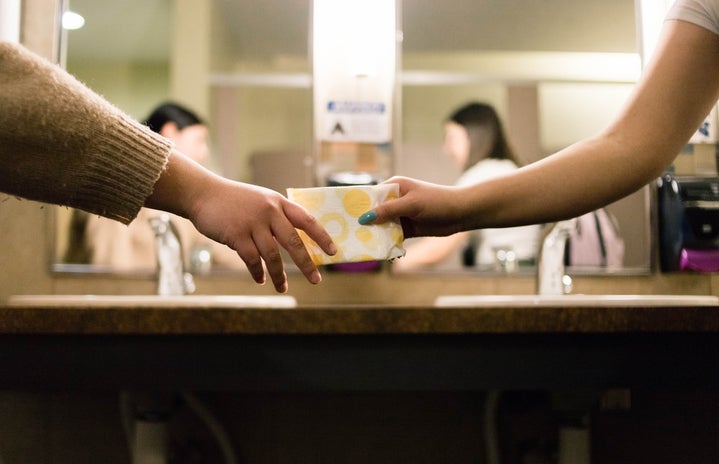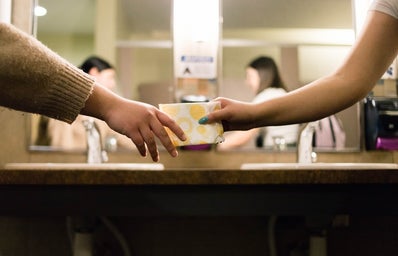Note: This is in no way medical advice, nor should this be used as a diagnostic tool. This is just a way for me to share my experience and to spread awareness about the disease.
As many people know, March is Women’s history month, but what many people do not know is it is also endometriosis awareness month, but what exactly is endo? Endometriosis (or endo for short) is a treatable, but incurable disease where tissue similar to what grows inside the uterus grows outside of it (World Health Organization). It typically affects the area directly outside of the uterus, but it has been found on all internal organs including the lungs. This mass of cells can be compared to a benign tumor as it is a rapid growth of cells in a place where they should not be. This is what we know about endometriosis. We also know that it causes extremely painful periods, often disabling people for days. We know it can make sex extremely painful. We know it can make becoming pregnant difficult and even impossible for some women. We know that it causes people to experience fatigue, bloating, nausea, headaches, anxiety, and depression. We know that for many people, endometriosis causes pain so extreme that the only relief from it is to sleep, but sleep is impossible because of the pain. We know that this affects 1 in 10 women. We know it takes an average of SEVEN years of actively going to the doctors with symptoms before actually being diagnosed. We know that it increases the risk for ovarian cancer compared to women without endo (National Library of Medicine). This is what we know about endometriosis.
However, there is so much we do not know about this disease. We do not know what causes endo. We do not know how to prevent it or if it can even BE prevented. We do not know how to cure it. We do not know how to diagnose it for sure, unless you are put under and cut open. We don’t even know what surgical procedures work to treat endo.
Both these knowns and unknowns are things I often think about. How is it possible there is an incurable disease that affects so many women so severely, yet health professionals barely spend a day covering all of womens reproductive system disorders. A disorder that destroys the internal organs of 10% of women, gets about one hour out of the YEARS of education a health professional has to go through. Maybe if it was adequately talked about, it would not take an average of 7 years to diagnose. Maybe a woman could be able to get treatment before it gets to stage 4 and spreads to other internal organs. Maybe if it even got a quarter of the attention as erectile dysfunction (a disorder that affects a man’s pleasure) endometriosis (an incurable disease) could be caught before it causes infertility, before it spreads throughout the body, and give women their quality of life back. Maybe I’m just wishful for an educational change that needs to happen, but likely will not because the main symptom is painful periods, and periods are such a taboo topic for so many people.
Maybe I just have a very pessimistic view on the subject due to my experience. However, I was an extremely “lucky” patient when it came to getting a diagnosis. My journey to a diagnostic surgery was just under two years, which is practically unheard of. I got my first period fairly young. It was only a few days before my 11th birthday, the summer before going into 6th grade. I remember being kind of embarrassed, none of my friends had gotten theirs yet, and I really had no one my own age to talk about with. I remember how lucky I thought the other girls were. I hated carrying around a pad, I hated the mood swings that came with it, but mostly I hated the pain. I grew up knowing period cramps were a thing that were real and painful, but I also knew so many other women in my life (aunts, older cousins, teachers) who still completed their everyday tasks no matter the time of the month, and you could never tell based on their abilities whether they were ovulating or not. I felt like it was okay for me to feel this pain, but I couldn’t let it disable me because on one else did.
Nights were the worst for me when I had my period. The night before it came was always the worst. I did not sleep at all those nights because the pain made it impossible. I would pace my room all night because laying down and being still made it worse. Walking was the only thing that relieved it. I’d spend the entire night walking around my room completely exhausted, and would try climbing into bed with my heating pad thinking I’m tired enough the pain can’t keep me awake any longer. I was wrong. The pain would grow again to the point it was so bad that I could barely breathe, so I forced myself to get up and start walking again as it was the only thing that would take the pain down. I tried heating pads, ice packs, ibuprofen, midol, and extra strength naproxen, but nothing helped. Sometimes if I was lucky I would tire myself out enough to fall asleep around 3 or 4 am. Then I would get up at 7 and get ready to go to school. Obviously going to school with little to no sleep and in extreme pain is not advisable, especially not for an 11 year old, but I didn’t care. I pushed myself to go fearing I would fall behind and my mom would try to convince me to stay home and rest. In my eyes it was either being in pain all day in my bed stressing about missing school, or being in pain at school so I didn’t fall behind.
I thought this pain was normal because every other woman in my life was able to go on with their periods, so I was just being weak. My doctors told me this was normal. They had me fill out a pain scale and I put a 7/8 for my periods cause yeah it was painful and I couldn’t sleep or think straight, but there are other things that are worse. They told me not to worry, this pain is normal, just take some painkillers and go on with your normal activities.
By the end of 6th grade I started getting this annoying pain in my tailbone area to the point that I could not sit in the hard plastic chairs at school for longer than 10 minutes without being in pain. This was only the beginning of what I always just referred to as “tailbone pain” even though I know that’s not exactly where the pain is, it was just easy for me to use that phrase to refer to the lumbar area of my back extending all the way down to my tailbone. By that summer, the pain was bad. Mid-July the pain got to the point where I could not stand, sit, or even lay on my back. This was actually a pilonidal cyst not endo, but I do feel like it is a part of my story. For a week my days consisted of laying in my bed and if I felt good, laying on the couch! Those days I didn’t sleep and didn’t eat. I couldn’t. If I stood up (with help from one of my parents of course) tears immediately ran down my face. I had a period of extreme pain where I lost my vision and hearing. I could speak and I could feel my moms hand but I couldn’t hear her and could only see white. The only thing I had to help with the pain was good old ibuprofen. Finally after a week, the hospital had an opening for me (we had been trying to get a hospital appointment all week) we found out it was a pilonidal cyst, and it was bad. The doctor told me the pain I was feeling all week was equivalent to the pain of giving birth. Imagine that, birth with only ibuprofen, and dealing with that pain for a week straight when people are telling you you are fine, to walk it off, just wait. This is all to say that I started to have a distrust in doctors, and going through that led me to know that I need to listen to my body, and to know what pain is. After going through that I did not take pain lightly. If I say my pain is a 7/8 that is what is disabling to many people as well as myself. I know what a 10 for pain is so when doctors told me living with a 7 on a pain scale is liveable and I might just be exaggerating, I was livid.
The procedure to get rid of the cyst got rid of the intense, paralyzing pain, but it wasn’t all gone. This was where my mom and I started doing our own research. The next year to year and a half consisted of going to multiple specialists (I think we went to 4 different departments of medicine) asking what is causing this persistent tailbone pain, why are my periods so painful, why do I have an abnormally heavy flow and abnormal cycle, and could these things all be related? We asked my PCP if it could be endometriosis, but they told me it was impossible for someone so young to have it, and the pain wasn’t “bad enough” if I could still go to school. The other specialists said it may be the way I’m sitting that causes my tailbone pain, or that my brain is still sending signals of pain from the cyst even though it’s gone. I was told my period pain is normal. I was told it was normal to bleed through multiple pads a day. It was normal for me to stay awake at night from my cramps. No matter what doctor we asked, they all said it was impossible for me to have endometriosis even though I have all the symptoms. I felt belittled by these doctors who had years of medical training. I felt like my pain in my tailbone was in my head, and my periods were something that was normal, and I shouldn’t be going to them about this. They made me feel foolish and Like I was wasting my time.
The next summer, no one had answers still, so one doctor decided they thought they could help. I still don’t understand their thought process behind this, but my mom and I were desperate for a solution. The doctor cut out a portion of the tissue surrounding my tailbone and stitched it up. I was awake for this, and it was the most useless thing that could have been done. If anything it added more pain.
I am very grateful for my mom throughout all of this because she never once doubted me. She knew that my pain was real and was affecting my quality of life. She also kept pushing endometriosis thinking that based on her research, it was what I had. I ended up getting an MRI and ultrasound to “see” the endometriosis, but of course they didn’t find anything. (Endometriosis can not be found on any type of scan, as stated above, it can only be found through a surgical procedure). My mom did not give up. She found a world renowned doctor who dealt with endometriosis in children and young children, and she got me an appointment with him. He believed me. I started crying in his office, because after being told that your pain is mostly in your head, your cramps are normal, nothing is wrong with you, it’s impossible for you to have endometriosis, I finally had a doctor who heard me. But I was also crying about what this meant for me. I always wanted to have kids and being told at the age of 13 that it might be impossible for me was hard. Being told I likely have an incurable disease that also makes my chances of ovarian cancer higher was hard for me. I know I am lucky because I am able to live a full life, and we received a diagnosis after about 2 years of fighting for it, but it doesn’t make it any less difficult.
I went through a three month trial phase to see if regulating my periods with an oral contraceptive would help the pain. When it did not affect the pain my doctor was almost sure this meant I had endo. I was booked for a surgery that was in 2 months which confirmed what my mom and I had known for a while now, I had endometriosis. Again I was lucky because it was only at stage one which meant my reproductive organs were not destroyed and having children might be possible for me.
The pain wasn’t magically gone though. It took about a year of physical therapy to get it really under control. I remember the first time I went all day without being in pain, it felt like a miracle to me. There were still days when the pain was bad. I still couldn’t do simple things like carrying a backpack, wearing heels, sitting for long periods of time without a flare up, but the days where the pain had me paralyzed were becoming far and few between.
Since the surgery, I started to take an oral contraceptive continuously, so I would not get my period. The reason for this was two-fold. First, my endo doctor didn’t want me to deal with painful periods which would likely still happen, and secondly, one popular belief for the growth of endo is during ovulation, so the birth control was a way of preventing it from growing back. I had to take it every night at the same time because if I was even 30 minutes off on some of the pills, I would bleed. I was terrified of bleeding because I was terrified of going through that again. I tried 4 different types of oral contraceptives, testing to see which ones had the least amount of side effects for me. I won’t go far into it.
Then sometime in 2022, I stop seeing my endo doctor because I have found what works for me, but with all the unknowns, I start seeing things that worry me. I read in many academic journals that my type of surgery (burning the cells) won’t effectively get rid of all the endometriosis, and the best surgery is going in and cutting it out. After talking to another doctor, we decided it is best for me to get another surgery under a different doctor in a different hospital. I got that surgery on June 1, 2023. I was terrified of it growing back but the second surgery really helped to calm these anxieties. This surgery was much more intensive and they used 5 incisions compared to the 2 in my prior surgery. They assured me there was very minimal growth, and they checked to make sure everything else looked good too. While I was under, I also had an IUD put in (would never get that put in while awake) so I could stop taking my oral contraceptive because I hated the way it was making me feel. I was told I shouldn’t need another surgery until I start thinking about having kids. When that time comes, I need another to make sure everything is still okay.
I know I am very lucky when it comes to my endometriosis journey, and I have no clue what I would have done without my mom. I feel like I was jumping through hoops and pushing against so many people, just for them to believe me, and looking back, I am very angry at all the health professionals that had no problem brushing me off. I am only one of the millions of girls and women who are affected. I had it “easy” and I could never imagine what other women who waited over 10 years for a diagnosis had to go through. I hate how little information there is out there about endometriosis even though it affects 10% of the global female population. I hate that other women are out there suffering. I feel attention genuinely needs to be brought to this.


